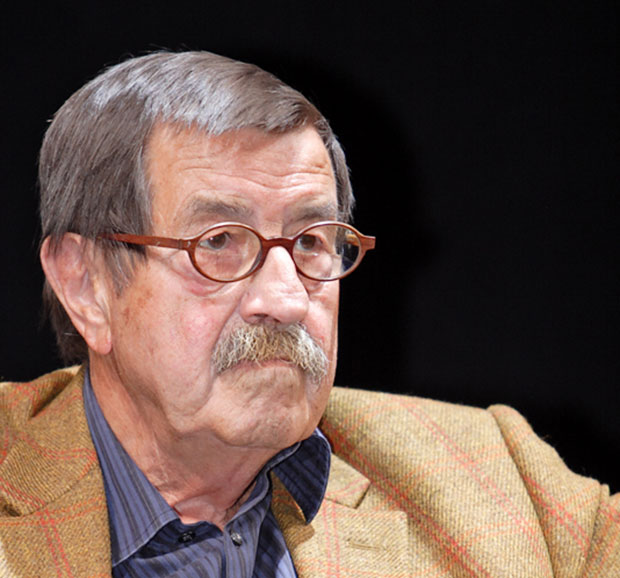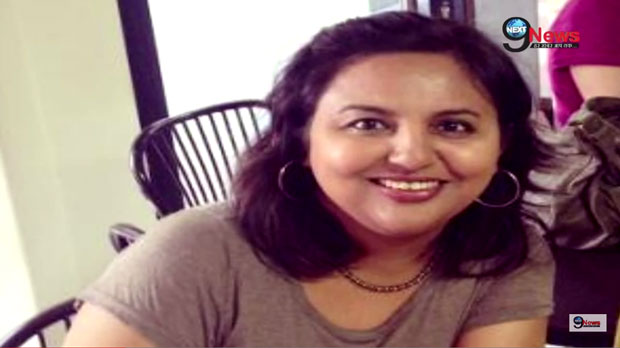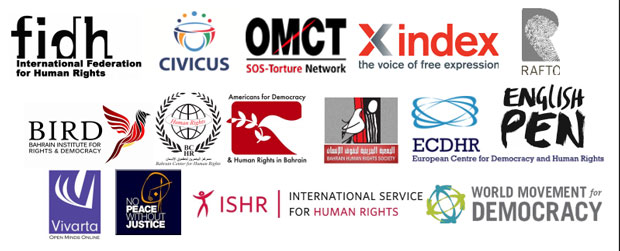14 Apr 2015 | Magazine, mobile, News

Gunter Grass in 2006 by Magiers. Licensed under CC BY 2.0 via Wikimedia Commons)
Günter Grass, a German novelist, poet, playwright, illustrator, graphic artist, sculptor and recipient of the 1999 Nobel Prize in Literature, died on April 13 at the age of 87.
Grass authored two articles for Index on Censorship magazine, both of which have been made freely accessible.
September 1999: After the fall: The year is 1989. A wave of revolution, unexpected and uncontrolled, is gathering momentum on the fringes of the USSR. Within a year or two, it will have swept away the entire Soviet Empire and brought the Cold War to an end
January 2001: I remember: Whenever we make our plans for the future, the past has left its mark on what we thought was virgin territory; it has set up signposts that just lead us back to what we have already lived through
Subscribe to Index on Censorship magazine.
13 Apr 2015 | Campaigns, mobile, South Africa, Statements

Zainub Priya Dala (9News / YouTube)
A South African novelist has been subjected to harassment and violently assaulted for expressing an opinion of Salmon Rushdie’s work. Zainub Priya Dala, a psychologist and a physiotherapist specialising in autism, recently published her first novel, What About Meera.
While speaking at a school literary event in March, Dala expressed admiration for Rushdie’s work. The following day she was threatened by three men in a parking lot. The assailants placed a knife to her throat and hit her in the face with a brick, calling her “Rushdie’s bitch.” The attack ended when a minibus entered the lot. Dala said she believes she would have been stabbed had the attack not been interrupted.
Dala reported that she has come under pressure from some of Durban’s religious leaders to renounce her statements on Rushdie and his work. She has been told to say the prayers and seek forgiveness.
Diagnosed with post traumatic stress disorder, Dala is currently being treated at a hospital, where she went reluctantly and where she is being held against her wishes. Index is pleased to hear that she has now been discharged from the facility.
Index calls on South Africa’s government to protect the right of individuals to freedom of expression guaranteed by the country’s constitution. Further, South Africa must provide protection for Dala.
“South Africa is a modern democracy that has publicly committed to upholding the values of free expression and the rights these values afford individuals,” said Index CEO Jodie Ginsberg. “It is incumbent on South Africa to show it believes and supports these principles by supporting Zainub Dala and by taking action against those who would silence her.”
13 Apr 2015 | Bahrain, Bahrain Statements, Campaigns, mobile, News, Statements

Bahraini human rights defender Nabeel Rajab (Photo: The Bahrain Institute for Rights and Democracy)
We in the Bahrain and international human rights NGO community condemn the arrest and detention of Nabeel Rajab, a prominent human rights defender in the Kingdom of Bahrain.
On 4 April, the Bahrain Public Prosecution Office renewed Mr. Rajab’s pretrial detention for a further 15 days. We call on the Bahraini authorities to immediately and unconditionally release Mr. Rajab and to drop all charges against him.
On 2 April 2015, security forces surrounded Mr. Rajab’s home and arrested him in relation to two new charges involving a series of recent tweets and an opinion piece published in the Huffington Post. The first charge is for “insulting a statutory body” in connection to his documentation of mistreatment and torture in Bahrain’s Jau Prison. The second charge of “spreading rumors during wartime” relates to his reporting on civilian deaths in Yemen, in contravention of a government prohibition of any public mention that is critical of the conflict. If he is convicted on all current charges, Mr. Rajab could face more than 10 years in prison.
At the request of the public prosecution, Bahraini authorities advanced Mr. Rajab’s scheduled appeal hearing from 15 April to 5 April, only to adjourn it to 5 May. This appeal concerns the six month sentence handed down to Nabeel Rajab on 20 January in relation to a tweet critical of the Bahraini Ministries of Interior and Defense.Mr. Rajab’s continued harassment and prosecution is a clear violation of his right to freedom of expression as guaranteed by the Universal Declaration of Human Rights (UDHR) and the International Covenant on Civil and Political Rights. Article 19 of the UDHR states that, “everyone has the right to freedom of opinion and expression…” while Article 19 of the ICCPR provides that, “Everyone shall have the right to freedom of expression; this right shall include freedom to seek, receive and impart information and ideas of all kinds, regardless of frontiers, either orally, in writing or in print, in the form of art, or through any other media of his choice.”
We therefore call on the government of Bahrain to immediately and unconditionally release Mr. Nabeel Rajab from custody and drop all charges against him. We further call on Bahrain to ensure free and peaceful expression, and to cease all harassment of and restrictions against civil society and human rights defenders in Bahrain.
Sincerely,
•Americans for Democracy & Human Rights in Bahrain (ADHRB)
•Bahrain Center for Human Rights (BCHR)
•Bahran Human Rights Society (BHRS)
•Bahrain Institute for Rights and Democracy (BIRD)
•CIVICUS: World Alliance for Citizen Participation
•English PEN
•European Center for Democracy and Human Rights (ECDHR)
•FIDH, within the framework of the Observatory for the Protection of Human Rights Defenders
•Index on Censorship
•International Service for Human Rights (ISHR)
•No Peace Without Justice
•OMCT, within the framework of the Observatory for the Protection of Human Rights Defenders
•Rafto Foundation for Human Rights
•VIVARTA
•World Movement for Democracy

Background:
Index award winner Mr Nabeel Rajab is the President and Co-Founder of the Bahrain Center for Human Rights, Deputy Secretary General of the International Federation for Human Rights (FIDH), and a member of Human Rights Watch’s Middle East Advisory Board.
Bahrain authorities have previously prosecuted Mr. Rajab on politically motivated charges. They have never presented any credible evidence that Mr. Rajab has advocated, incited or engaged in violence.
Mr Rajab was detained from 5 May to 28 May 2012, for Twitter remarks criticizing the Interior Ministry for failing to investigate attacks carried out by what Mr. Rajab said were pro-government gangs against Shia residents. On 28 June 2012, a criminal court fined him 300 Bahraini Dinars (US$790) in that case. Authorities again detained Mr. Rajab on 6 June 2012, for another Twitter remark calling for Prime Minister Khalifa bin Salman al Khalifa to step down. On 9 July 2012, a criminal court convicted and sentenced him to three months in prison on that charge. A court of appeal overturned that verdict, but in a separate case a criminal court sentenced him to three years in prison for organizing and participating in three unauthorized demonstrations between January and March 2012. An appeals court reduced the sentence to two years, which Mr. Rajab completed in May 2014.
In September 2014 Mr. Rajab traveled to Europe to call for stronger international action on Bahrain. He met with representatives of various governments, the European Union, the European Parliament, and participated in the 27th Session of the United Nations Human Rights Council.
On 1 October 2014, less than 24 hours after his return to Bahrain, Mr. Rajab was summoned to the Criminal Investigations Directorate (CID) Cyber Crimes Unit for interrogation, where officers arrested and interrogated him for a number of hours in relation to a tweet he published while abroad. This arrest ultimately lead to Mr. Rajab’s conviction on 20 January 2015, on charges of “insulting public institutions,” referring to the Bahrain Ministries of Defense and Interior. The Bahraini government charged him in relation to a tweet in which he criticized members of the Bahraini security forces who have joined the ISIS extremist group. Mr. Rajab was charged under Bahrain’s penal code which unduly restricts and criminalizes, “[offending] by any method of expression the National Assembly, or other constitutional institutions, the army, law courts, authorities or government agencies.” The court sentenced him to six months in prison. Following international attention in his case, Mr. Rajab was released on bail pending the completion of his appeal.
Most recently, Mr. Rajab was arrested on 2 April 2015 on separate charges of insulting a statutory body, and spreading rumors during wartime. The former charge is related to Mr. Rajab’s documentation of human rights abuses at Bahrain’s Jaw Prison on social media. The latter is related to his documentation and criticism of Bahraini involvement in the Yemeni conflict in an opinion piece written for the Huffington Post.
Simultaneously, Mr. Rajab’s previous case has been reopened by the public prosecution, impeding his appeal. If these charges are upheld, and he is convicted of the new charges, Mr. Rajab may face over 10 years in prison.
10 Apr 2015 | Events, mobile

Index on Censorship magazine are holding a big debate, in partnership with the Leeds Big Bookend festival.
Does freedom of religion and freedom of speech come as a package or can you pick and choose? Do those people who suggest freedom of expression should be “civilised” and that we should be wary of causing offence to people’s religious sensibilities have a point? Or is the world full of offended people and any idea of holding back ends up with us not being able to talk about important issues?
Panellists: Anthony Clavane, playwright, journalist and author of Promised Land and Sunday Mirror sports journalist: A Northern Love Story; Chris Bond, journalist with the Yorkshire Post; Chief Imam Qari Muhammad Asim MBE of Leeds Makkah Masjid; Rachael Jolley, editor of the Index on Censorship magazine
WHEN: Wednesday 10th June 2015, 6.30pm
WHERE: Waterstones, Albion Street, Leeds
TICKETS: £3 / available here





